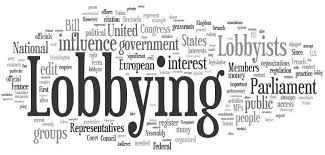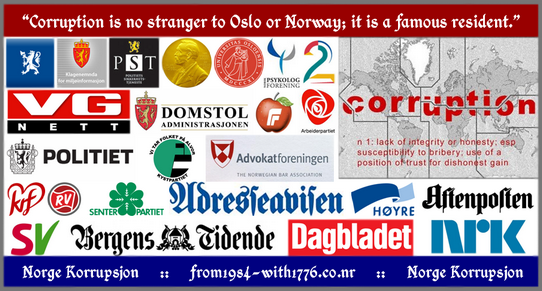Does Norway have a corruption problem?/amp
HUMAN SYNTHESIS
email: humansynthesis0@gmail.com
###Does Norway have a corruption problem?
From Your Q-Digest
Shane Murray worked at Freya Investments
05 February 2018

Norway does not have a corruption problem as we would think of it in terms of direct bribery. The following should be thought of as a primer to get people thinking on what is corruption and how different cultures might perceive it.
As a Norwegian lawyer told me, the law in Norway is written one way and practiced another. Generally, there is leeway in the law that gives decision makers a certain amount of discretion.
How this leeway is applied then boils down to who you are and who you represent when dealing with the decision maker in some cases. If you are an insider in the country it is much easier to be granted a decision in your favour than if you are not. It is possible to become an insider by marrying one of the tribe or just figuring out how things work and then fighting tooth and nail to be at the inner rings of power.
Sometimes, you can get the leeway in your favour by just being polite and a bit insistent, this works especially well in getting things prioritized in a queue or going slightly outside of a bureaucratic guideline.

Norway is still in the Keynesian state of mind where the government knows better than its people (although this is shifting). Under that framework, have often met people in the public sector who think they know better than the individual that they are making decisions for, they are the worst to encounter as zealots always are. There are other types of people who take up their own mission in their workplace, such as realizing its easier to deny everyone and only process and approve the complaints. This is not corruption, but it is an abuse of power at the worst and an unintended consequence of policy at the least.
Norway is not a place for weak people, decision makers will often say no, and there are lots of people deciding for you. The individual has to keep fighting and bringing the argument back to the table again and again. You can often win an argument here by moving it up the bureaucratic hierarchy as the lower level bureaucrats will often bend so they don't get the negative attention of higher-ups. This is not corruption but it does cause the default to often be a malaise or manana attitude rather than getting things done.
One aspect that has changed dramatically since 1995 is the growth of the lobbyist in Norway. When I arrived here there were a handful of lobbyists now there are 100’s. This is a type of corruption as it allows those with power and influence to gain better access to the inner circles of power than those who do not have access to lobbyists. The everyday Norwegian is being further left out in the cold.
There is a problem with discrimination here, which keeps a fair deal of outsiders from gaining access to power. This discrimination can be against a leader from another area of Norway moving to a small rural area, where the outsider is not accepted for several generations. This is a sort of corruption as it holds people back from reaching their full potential in exchange for a given group to hold onto the reigns of power (and often failing to drive power in a useful direction for either themselves or the society at large)*.

If you are going to negotiate with Norwegians always do so from a superior position of power as that is what they understand and respect the most. It's not about what great ideas you have or your capability to pull them off. The mentality of “Who are you, and what threat you are to me” seems still to be stronger than the “What do you have to offer, and how can we work together” attitude. Some people would view cronyism or the good old boy and girl network as corrupt, but don’t think it seen that way internally**.
If you have a good idea and share it with a Norwegian they will often want to steal it rather then work with you. If you play this right it can work to your advantage. While this is not corruption it is a form of not working in good faith which is unacceptable in business. Good ideas are a dime a dozen it is the execution of good ideas that is the hard part, and its a bit humorous to see Norwegians fall on their face on this matter. Would say every outside entrepreneur I have met has had this as an issue. The way to use it to your advantage is to feed Norwegians bad information or let them be the hero in their own demise***.
For example, one of my friends owned a pizza restaurant that a Norwegian family wanted to buy because it was so successful (this is out in the districts and some time ago). My friend knew this family as lazy and not service oriented. He waited a year after numerous inquiries from the family and finally sold at quite a high profit. The Norwegian family took over the restaurant and ruined it, later it was either purchased back from them or the bank (can’t remember which) at a fraction of the price and made successful again.
Another example is since you can feed Norwegians information you can then place your business at another level in the hierarchy that they would be reliant on. If you play it right many will “join the gold rush” and you can be the one making all the money selling them the picks and shovels. A great example of this was during the 2007 financial crisis where American bankers who had good relations with some Norwegian bankers convinced them to buy a boatload of toxic debt****.
Of course, it would be nice if people could just work together above the board but that is not a cornerstone of Norwegian business culture, and that is the funny sort of thing about Norway, its the type of corruption of a system that is meant to be fair and equitable that ends up shooting Norwegian’s in their own foot. It's largely why it's the state-owned companies that are the most successful in terms of competing internationally because the private side is busy competing over the Norwegian piece of the pie rather than making more pies that are attractive to the rest of the world.
Finally, there is a lot to be said about Norwegian charitable institutions, but that would be a whole different post. They should be measured by their ability to solve challenges not put a band-aid on the symptoms in order to justify their existence.
*I wrote a thesis about this that showed at least one Norwegian district who wanted to change could not because they did not have the internal ability to, yet would not accept outsider leaders being key decision makers. Outside of the thesis, field notes demonstrate this to be true in some other districts and sort of Norway overall (it's still a developing economy based upon its exports of raw resources and imports of advanced goods).

The principle of lobbyism
**Have seen many government contracts awarded to kin-related businesses. Out in the districts, it does not really matter so much which party is in power, rather than the right family names hold the majority of it. This power is often then distributed to fellow tribe members through the award of contracts. Insiders tell me, that politicians in the parliament are often playing smash and grab as well, as when you get the power you must take it to those you are beholden to that got you there.
***As an aside, there is a much different worldview in Norway then America that may help to explain some behaviours. In America, we like to be the first mover “the early bird gets the worm”. In Norway, their worldview is more often “the early bird gets eaten by the cat”.
****Think Norwegians (and Americans) still live in the “F.ck you buddy” or Prisoners Dilemma worldview on economics. For example, in the US or Norway would say a very high percentage of Corporate Social Responsibility is largely some sort of whitewashing. Think a country like Sweden is more advanced at implementing Porter’s Creating Shared Value thinking. This is based on living in all three countries and having had conversations with several sustainability strategists, it seems Sweden is much more likely to integrate CSR into their business models and culture than Norway (or definitely the US).
Shane Murray
WHO and WHAT is behind it all ? : >
The bottom line is for the people to regain their original, moral principles, which have intentionally been watered out over the past generations by our press, TV, and other media owned by the Illuminati/Bilderberger Group, corrupting our morals by making misbehaviour acceptable to our society. Only in this way shall we conquer this oncoming wave of evil.
Commentary:
The people of Norway are losing control over their elected representatives in the Stortinget who have become obedient puppets of their EOS-EU-ECFR masters.
Erna Solberg is ´hell-bent´ on FULL EU membership and global participation in the eventual NWO. The Norwegian people have during TWO votes, elected NO to EU. We have to get out of the EU clutches before they have taken control of ALL our natural resources.
Administrator
HUMAN SYNTHESIS
All articles contained in HUMAN-SYNTHESIS are freely available and collected from the Internet. The interpretation of the contents is left to the readers and do not necessarily represent the views of the Administrator.